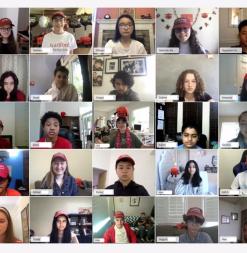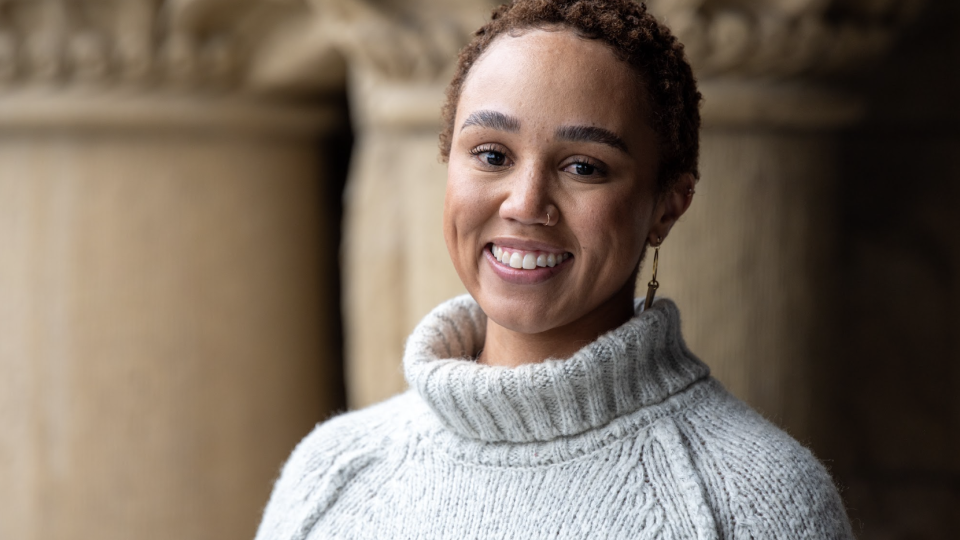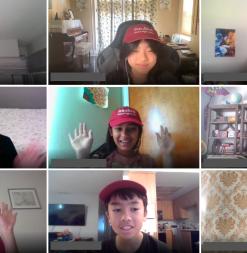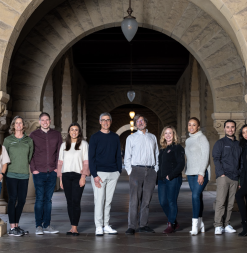Stanford Online High School (OHS) is committed to fostering a diverse, inclusive and accessible community. We endeavor to create an equitable, safe, empathetic, and just learning environment where students belong and thrive. Stanford OHS honors students’ authentic identities, varied perspectives, thoughts and experiences. We recognize that creating this environment is an ongoing task. Our shared accountability to diversity is essential to our strength as an intellectual community.
Our Global Community
Our students come from a range of locations, identities, backgrounds, and experiences.
60% Students of Color
16% Students Living Outside U.S.
$2.5 Million Financial Aid Budget
48 U.S. States & 1 U.S. Territory Represented
42 Non-U.S. Countries of Residence Represented
Our Commitments
We recognize that fostering an equitable, inclusive, and accessible community is an ongoing journey. These commitments reflect our continuous and actionable steps to cultivate a safe, empathetic, and just learning environment.

Student Body
Stanford Online High School proudly celebrates the diversity of our global student body, recognizing that our students' unique identities and perspectives enrich our community.
Through affinity groups, students organize and attend events that provide safe spaces for support and connection with peers with common identities. Student Life activities and clubs offer opportunities to explore diverse cultural interests, inclusive action, and academic passions.
Student leaders participate in the NAIS Student Diversity Leadership Conference (SDLC), where they develop cross-cultural communication skills, foster allyship, and design strategies for social justice to strengthen our community further.
Through affinity groups, students organize and attend events that provide safe spaces for support and connection with peers with common identities. Student Life activities and clubs offer opportunities to explore diverse cultural interests, inclusive action, and academic passions.
Student leaders participate in the NAIS Student Diversity Leadership Conference (SDLC), where they develop cross-cultural communication skills, foster allyship, and design strategies for social justice to strengthen our community further.

Welcoming Community
Students and staff are welcomed into a community that encourages them to present their most authentic selves. Stanford OHS strives for every member of our global community to feel valued and supported, recognizing that acceptance, respect, and support are the foundations of a strong sense of belonging.
There are many opportunities for students and staff to connect with their peers through activities and wellness efforts. These efforts include the student peer-mentorship program, student government, new instructor onboarding workshop series. There is also a Community Advisory Group where school leadership, alums, and families exchange ideas and collaborate to strengthen their belonging within our community.
There are many opportunities for students and staff to connect with their peers through activities and wellness efforts. These efforts include the student peer-mentorship program, student government, new instructor onboarding workshop series. There is also a Community Advisory Group where school leadership, alums, and families exchange ideas and collaborate to strengthen their belonging within our community.
Outreach Programs
Stanford OHS Outreach Programs serve over 3,000 students from around the world through online and residential enrichment programs.
The Stanford Middle School Scholars Program (SMSSP) is a tuition-free bridge program that supports 6th and 7th-grade students in developing the skills to apply to Stanford OHS and other academically rigorous programs. SMSSP offers device lending and provides course supplies. These efforts, along with our scholarship endowment from the Malone Family Foundation, increase students' access to Stanford OHS.
The Stanford Middle School Scholars Program (SMSSP) is a tuition-free bridge program that supports 6th and 7th-grade students in developing the skills to apply to Stanford OHS and other academically rigorous programs. SMSSP offers device lending and provides course supplies. These efforts, along with our scholarship endowment from the Malone Family Foundation, increase students' access to Stanford OHS.
Instructors & Staff
Stanford OHS instructors and staff come from diverse backgrounds whose varied perspectives enrich our community. Throughout the year, staff find community and support in affinity groups. Instructors and staff support our school's commitment by sponsoring student affinity groups and serving on the DEI Committee or the Global Education Committee.
Stanford OHS is committed to ongoing, culturally relevant professional development for instructors and staff. Staff participate in programs such as the Stanford University IDEAL Learning Journey and engage with educational equity experts through staff-wide workshops. Instructors and staff also attend conferences on equity, leadership, inclusive pedagogy, and engage in networking for people of color and allies within independent schools.
Stanford OHS is committed to ongoing, culturally relevant professional development for instructors and staff. Staff participate in programs such as the Stanford University IDEAL Learning Journey and engage with educational equity experts through staff-wide workshops. Instructors and staff also attend conferences on equity, leadership, inclusive pedagogy, and engage in networking for people of color and allies within independent schools.
Belonging at Stanford OHS

Nicole Varveris, Director of Equity and Inclusion
“Acceptance, respect, inclusion, and support are the foundations of a strong sense of belonging within a learning environment. At Stanford Online High School, students and staff are encouraged to present the most authentic version of themselves, and we celebrate the diverse and intersectional identities that make up our community. “



